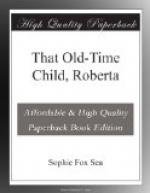Aunt Betsy declared she did not have one selfish bone in her whole body.
I think the reason of that was, there were so many about her looking to her for comfort in some way, that when little more than a baby in years she fell into the habit of thinking of and caring for others almost as a woman would.
Aunt Betsy was a rheumatic, and always ailing, and the child could not remember the time when her beautiful, patient mamma was not very, very sad. Although she smiled often on her little daughter, it seemed as if there were tears right behind the smiles, just like rain-drops shining through the rays of the sun. And when she crept close to her at night she could feel the long lashes sweep her cheek, and they were so often wet.
The negroes on the place, especially the older ones, would grumble out their aches and pains to the child, as if they thought she had the gift of healing. And indeed she had, in her way.
For when old Squire split his foot open with an ax, they lived so far in the country they couldn’t get a physician every time it needed attention, and her kind, brave mamma undertook to dress the wound herself every morning. She would let the deft little fingers squeeze a sponge full of tepid water over the cut as many times as it was necessary, then hold the scissors and bandages, and help in other ways. And old Squire said the tender, compassionate little face “ho’ped ’im as much as Miss July did.”
Those that need sympathy intuitively know where to get it. It’s just like the flowers reaching out for sun and dew.
I expect the city children who read this story feel very sorry for Roberta because she lived in the country. But they needn’t be, for she was never lonely and scarcely ever idle. The older negroes on the place said she was like “ole missus” (that was her grandmother) in her ways. And among other things they told about the old lady, to show how stirring she was and what a manager, was her method of arousing the household to their duties in the beginning of the week: “Wake up! wake up! I say. To-day’s Monday, to-morrow’s Tuesday, next day’s Wednesday, next day’s Thursday, then comes Friday, and Saturday will be here before you know it, and nothing done.”
Roberta didn’t belong to any “mite society” nor the “little busy bees,” where city children are trained to think of and help the poor, and she didn’t wear the badge of the “Society for Prevention of Cruelty to Animals,” as many children do nowadays. Indeed I don’t expect she ever heard there was such a society. But she was instrumental nevertheless in doing a great deal of real practical good. O, how her eyes did flash when she saw animals mistreated. She made beds for the cats and beds for the dogs; and when any of the milkers struck the cows while they were milking them, if she was near about, she would say, “Mamma says good milkers are always gentle with the cows, for they won’t give down their milk unless you treat them kindly. And anybody can tell by the quantity of milk you get whether you are good to them or not. If I was a cow I wouldn’t give down my milk if you struck me and hollered at me.”




